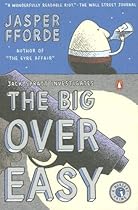
I love Janet Evanovitch. I was skeptical when my mom tried to talk me into reading her stuff. Surely she couldn't be as funny as my mom said right? I should have remembered the last time she was so adamant about me reading something, it was 10 years ago when she was trying to convince me to give Harry Potter a try! (Remember back when the entire world didn't know who Harry Potter was?!?! People thought I was odd for reading a kids book while in high school. I wasn't being nerdy, I was being trendy!)
Anyway, I tried out the Stephanie Plum series and LOVE them. My mom's entire office reads them. They really are hilarious. Like literally laugh out loud, make your husband give you really odd looks kinda hilarious. But they sound kind of stupid when you try to explain it to someone else. Just give one a try. I don't care who you are, you'll laugh. And if you don't, well, I wouldn't want to be friends with you.
So what are they about? Bounty hunter Stephanie Plum. Who's afraid of guns and usually keeps hers unloaded in a cookie jar. And who has a tendency to attract car bombs and nut jobs. She lives in Jersey and has a cast of surrounding characters who are definately Jersey through and through. She's got a crazy grandma who steals the show, and who definately isn't afraid to pack heat and enjoys trips to the funeral home for viewings. One of her coworkers and best friends is Lulu, a gigantic former prostitute who eats buckets of chicken and wears very little clothing. And she's torn between two men, cop Joe Morelli who has a bad boy streak despite his job and Ranger, a kick-butt bounty hunter/security company owner with an even bigger bad boy streak. I highly recommend you check them out.
Oh, and Stephanie eats a Tastycake in every book. Tastycake started in Philadelphia, so I made sure to get some when I was there a few weeks ago. They are appropriately named. Yum! I wish I had one right now. They taste homemade instead of all processed. They're basically Hostess treats, but even better. I'm drooling a little. They look like crap though. The boxes look so generic and they looked all squished and not good, but I am so glad I eat them anyway. Crumbly awesome goodness.










